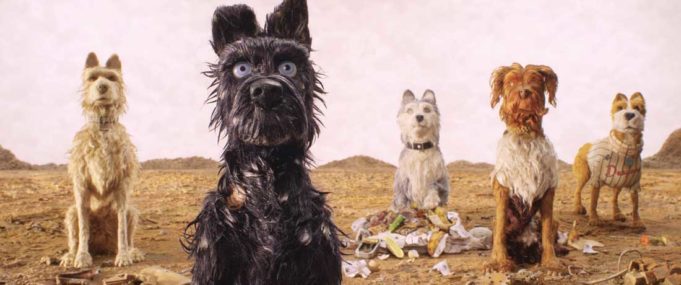I’ve seen a lot of movies about dogs, and as with most other subjects, some of them have been terrific (Best in Show) and many others have been bad (A Dog’s Purpose). Wes Anderson’s stop-motion animated film Isle of Dogs — note the pun in the title — is the best one I’ve ever seen about what it means to love a dog and perhaps what it means for the dogs to be attached to humans. After his unjustly neglected previous foray into animation, Fantastic Mr. Fox, his newest effort isn’t to be missed as it expands into Tarrant County this week.
Set in 2038 in the Japanese metropolis of Megasaki, the film begins with a note explaining that while the human characters talk in their native language, the dogs’ dialogue has been rendered into English. When a terrible disease ravages Megasaki’s dog population and threatens to spread to humans, the city’s mayor (voiced by Kunichi Nomura) declares that all dogs, feral and domesticated, will be rounded up and transported to the self-explanatorily named Trash Island to die. The mobbed-up, cat-loving mayor goes so far as to offer up his own dog Spots (voiced by Liev Schreiber) as the first exile. Six months later, the mayor’s 12-year-old ward Atari (voiced by Koyu Rankin) commandeers a small plane and crash-lands on the island to look for Spots. He’s met by a pack of alpha dogs, and while Chief (voiced by Bryan Cranston), a stray amid a group of former pets, objects to having a human in their midst, he’s outvoted by the other dogs (voiced by Edward Norton, Bill Murray, Jeff Goldblum, and Bob Balaban).
To the entirely warranted questions about Anderson setting this movie in Japan: It may or may not surprise you to find out that the filmmaker has quite a following in that country, with many of its film fans responding to his clipped tone, his fondness for symmetrical visual compositions, and his willingness to indulge in cuteness. In this movie, Anderson uses the fictional Japanese city as an aesthetic, much as he did with the East Coast island in Moonrise Kingdom and the central European nation in The Grand Budapest Hotel. With its backdrop of sumo wrestling matches and Noh plays, along with its sequences made to look like woodcut prints and silkscreen paintings, this is no more meant to be a realistic depiction of Japan than Gilbert and Sullivan’s The Mikado or Quentin Tarantino’s Kill Bill Vol. 1, depending on your cultural frame of reference. I do wish the leader of Megasaki’s pro-dog resistance hadn’t been a blonde American exchange student (voiced by Greta Gerwig), but this isn’t an insurmountable obstacle.
The setting is worth it just for characters expressing their emotions via haiku (“Whatever happened / To man’s best friend? / Falling spring blossom”). Anderson’s deadpan sense of humor is in full effect here, the better to showcase the occasional moments of bluntness – what could be more appropriate than a dog saying, “You son of a bitch!”? Of course, it’s easy to find parallels between our jelly-spined real-life president and this film’s mayor who wins elections by getting the citizens to blame the dogs for the city’s problems. Still, most of the humor is on a smaller scale, such as casting Yoko Ono as the voice of a lab technician named Yoko Ono or Tilda Swinton as a pug revered by the other dogs for her ability to foretell the future, which comes from the fact that she can understand TV broadcasts.
Better still is Cranston, giving the film performance of his career here. His tough-guy line readings ideally fit the role of a hard-bitten animal whose determination not to be a pet melts away under Atari’s love. An idle conversation among the alpha pack about favorite foods turns into a haunting monologue by Chief about his brief long-ago time as the pet to a large family. These plasticine animals kitted out with actual dog hair are somehow deeply moving, never more so than a flashback when Spots tears up after an electronic device helps him understand Atari’s Japanese. “I’m to be responsible for your protection and welfare on an ongoing basis,” says Spots in a typically Andersonian locution. “In other words, I’m your dog.”
The world’s harshness tends to creep in at the edges of Anderson’s films, but Isle of Dogs places it front and center, even in a scene showing a chef turning live sea creatures into sushi. The way this movie treats our relationship with animals makes it an unlikely cousin to Bong Joon-ho’s Okja, and yet Anderson’s dryly funny, tactile, and affectionate movie will do what all those other dog movies didn’t: It’ll make you go home and look at your dog with fresh eyes.
Isle of Dogs
Voices by Bryan Cranston and Koyu Rankin. Written and directed by Wes Anderson. Rated PG-13.












